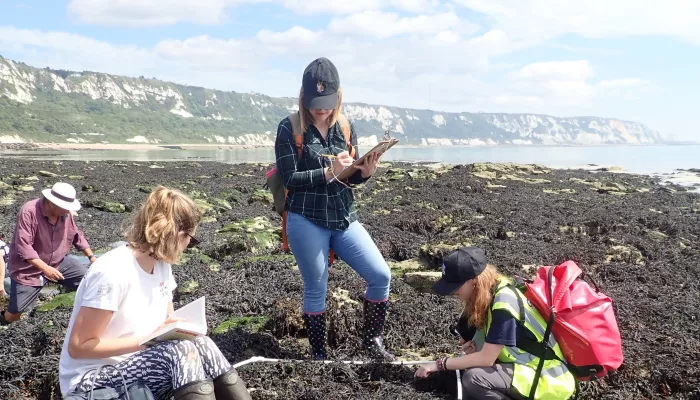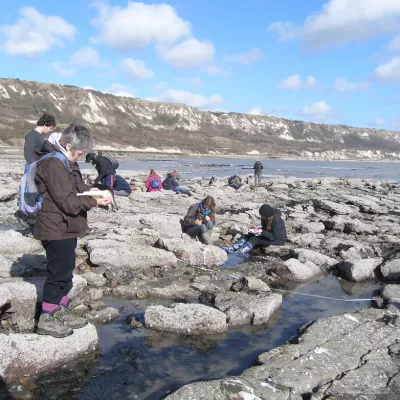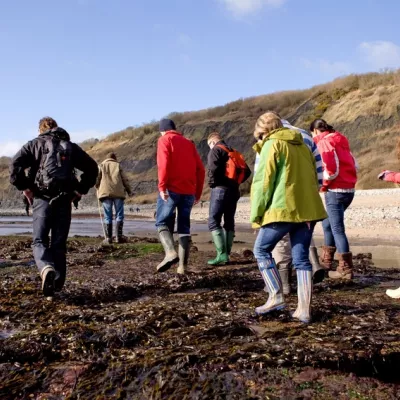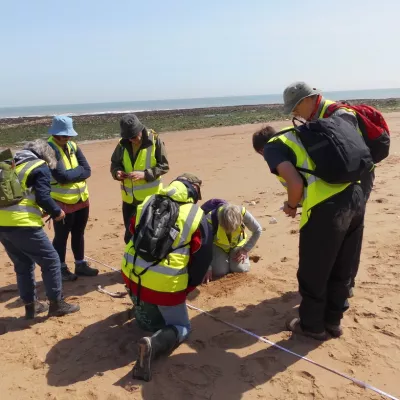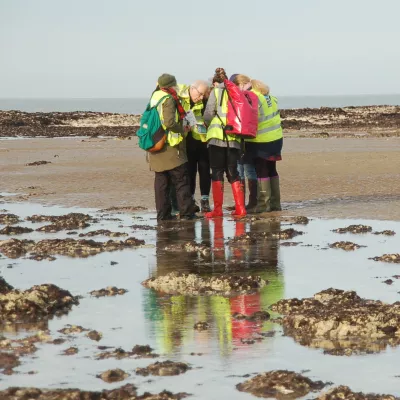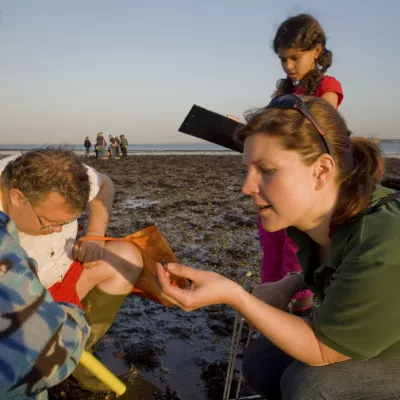Shoresearch is a citizen science survey which takes place across the country with varying Wildlife Trust's all following the same method. Here in Kent we utilise the intertidal rocky shore survey technique, owing to our marvelous chalk reefs. We carry out these surveys throughout the year all around Kent's magnificent coastline. Our aim is to record the species we find in a marked location (species presence surveys). On occasion we also carry out more detailed surveys looking at species abundance. The data we collect goes into The Wildlife Trust's National data base which can be used to inform marine conservation decisions; all the data is sharable and freely accessible.
Shoresearch surveys in Kent are run by Kent Wildlife Trust throughout the year, usually with one survey taking place a month. They are the perfect opportunity for anyone to get involved in the marine environment and start having fun identifying and recording the animals and algae communities found on our rocky shores. You are guaranteed to meet new and interesting people with a wealth of knowledge and experience!
FAQs
Everyone is welcome to come to the events - you do not need to have any knowledge of marine life before joining in with Shoresearch, and you can usually simply turn up on the day. The surveys provide a good opportunity for those new to marine life identification and marine surveys to learn in the field from experienced Shoresearchers. Shoresearch events are not usually suitable for young children or dogs, and anyone under 18 must be accompanied by an adult.
Please email Sherece Kesner to get involved.
For surveys, please bring along:
- Warm, waterproof and windproof clothing (waterproof trousers are often useful), including a hat and gloves!
- Sturdy footwear - wellies or other waterproof footwear with good tread, and preferably good ankle support.
- Sun protection.
- Water - shoresearching can be thirsty work!
- A hand lens is useful, if you have one.
- Some people find washing-up gloves useful for searching in rock-pools in cold weather.
- Collins Pocket Guide to the Sea Shore of Britain and Northern Europe is a useful field guide.
Shoresearch events are not normally cancelled due to rain, but if it is raining heavily or snowing, or very windy or stormy, then we may have to cancel the survey. If this type of weather is forecast, we may send out an e-mail to everyone on the Shoresearch e-mail list in advance, so please check your emails.
Do-it-yourself!
Together with Natural England and Medway Swale Estuary Partnership we've produced a range of videos and booklets to help you properly identify and report some of the invasive non-native species appearing across our coastline. View and download them below...
If you spot any of the species identified in our booklet or videos please report them to Medway Swale Estuary Partnership or directly to irecord including a photo and GPS position/OS grid reference.
Beneath the Water Booklet
In addition to the organised survey events, we are very keen to encourage people out on the shore at any time to fill in a Shoresearch form and send it to us.
Surveying for marine protected areas
As well as joining one of our Shoresearch events, you can help us by keeping an eye out for some key species that we are particularly interested in receiving records for.
There are some plants and animals that we would be particularly interested in hearing about, and the Beneath the Water guide describes this selection of species, which are all important for one reason or another. Some are rare in south east England, some have been introduced from other parts of the world and are becoming invasive, while others are native to Britain but spreading because of warming sea temperatures.
More detailed shore surveys
The Shoresearch form can be used to record comprehensive information, or simply to list species found at a particular site on a particular day.
If you don’t want to do something so formal, please just let us know about anything interesting that you find. Simply send us an email saying what you’ve found, the date and its location – photographs are also always very welcome!

